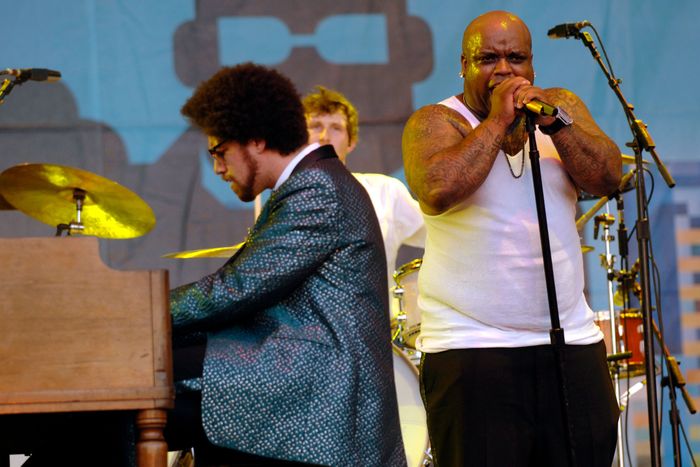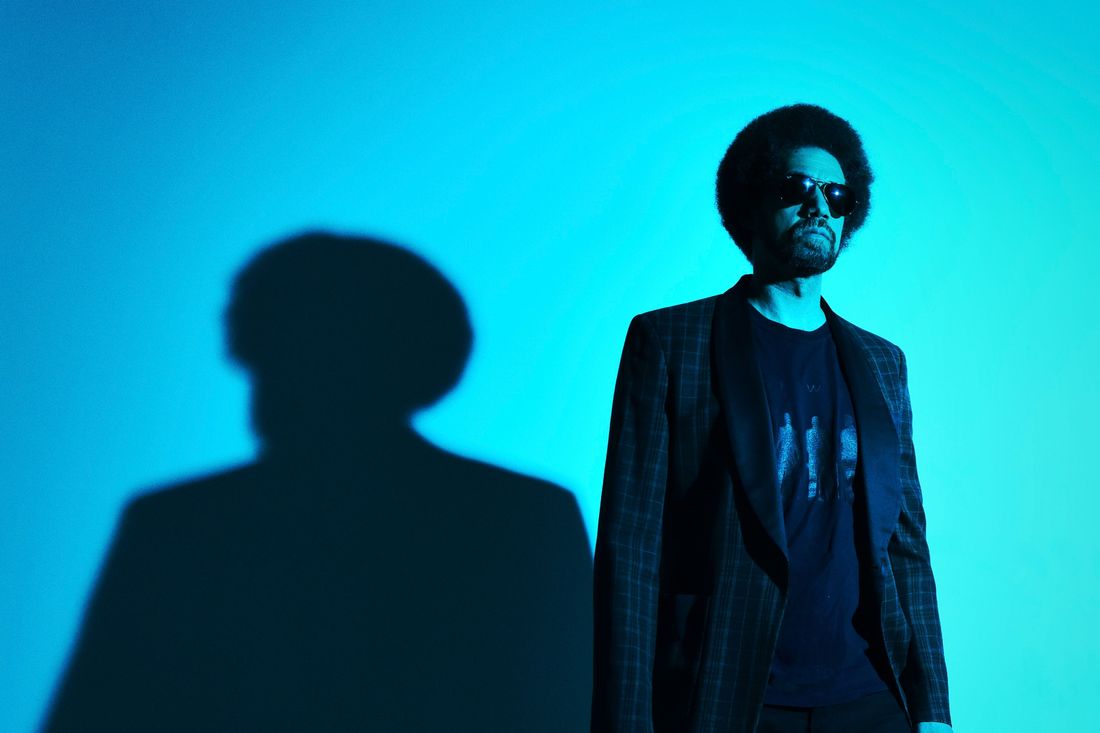
When I met Danger Mouse in Manhattan on an early-September afternoon, he was rocking a light business-casual outfit offset by a Black Bart Simpson tee. It’s a staple of a specific time and place, of the wardrobe of Black boys coming up in the ’90s, and, I think, a bit of an indication of an approach to the arts. The history of hip-hop culture is a story of Black teens putting their stamp on shit that wasn’t created with them in mind. Feeding funk records to samplers and making drum machines blurt out clattering, fast-paced patterns freaked the paradigm the same way Black Bart put you in scenes you hadn’t been drawn into. Pairing Jay-Z raps and Beatles samples on The Grey Album in 2004, matching slick beats and cartoon sounds to MF DOOM raps on 2005’s The Mouse and the Mask, pushing hip-hop syncopations on Shins singer James Mercer’s accomplished vocals in their albums as Broken Bells, and supplying Goodie Mob’s CeeLo with the psychedelic sounds that populated their lucrative Gnarls Barkley records, Danger Mouse got good at mixing the chocolate into the peanut butter, reaching mainstream and indie audiences, and bridging hip-hop and indie-rock fandoms. Ahead of Friday’s release of the third Broken Bells album — Into the Blue, inspired in part by the trippy indie pop of Georgia’s Elephant 6 collective, acquaintances from the time Danger spent in Athens — I spoke to the veteran producer about nudging mainstream artists past their comfort zones, creating a unified vision of popular music, and working with brilliant minds we’ve lost, like DOOM and Sparklehorse’s Mark Linkous. He also confirmed that the physical copy of The Grey Album I bought in Manhattan 18 years ago was not one of the official original batch.
This year, you’re dropping two albums in a handful of months. We don’t usually get that. It happened with The Mouse and the Mask and Gorillaz Demon Days. Now Cheat Codes with Black Thought and Into the Blue with Broken Bells are landing two months apart.
It’s just both of these albums took so long to make, and the pandemic slowed it down, but that extra time also made them more rich in a way that I normally wouldn’t have. I would’ve finished them and started making new records. But since I kept having more and more time, I obsessed over these albums. I worked on them so much that I thought, If I don’t get these out now, I’m going to ruin them. Go. Just put them out. I didn’t want to push either one of them to the next year. And I didn’t know how much they were going to overlap. I just figured a lot of music was going to get released this year because people are holding stuff back.
Speaking of overlap, talk about getting three records out of James Mercer, who is in a band, the Shins, with their own somewhat consistent schedule. Do you have to get real serious about carving out time? How does that work?
Well, he’s one of my closest friends, so we never really stop working or stop hanging out. Every once in a while, we’ll go a year without doing something, but it’s usually because he is on tour or he’s in a Shins cycle. But it’s our friendship. I mean, the Bells thing really is that. We became such close friends. He’ll leave his family and come hang out with me for a week or two, and we just record and get our friendship back up, and we just do our thing. And it’s always fun to do that, from the time we started in 2009. This time around, it was never supposed to take this long. We did “Good Luck” and “Shelter,” but we really didn’t dig in on the album. Years were going by, and we just decided to put out those two songs. Then we had to jump in and do this one. To me, not to be hyperbolic, but James, as a songwriter and a melody person, is one of the greats. Period. I’m really close to it, but I think that’s going to be pretty clear in years to come.
It was clear from the second Shins album that he is a world-class melodicist. And I think Broken Bells is kind of about challenging him as a singer.
It was very similar to how I learned to work with Damon Albarn. My favorite thing is usually to work with one vocalist. We make music together, then I get them to sing. But it’s very similar to how I do hip-hop records, which was you make the music and then you have somebody react to it. A lot of rock musicians, when they do songs, that’s not the way they do stuff. When they’re making music, they’re doing melodies and new stuff. They’re all kind of constructing at the same time. I found that when you have someone react to a piece of music that they haven’t heard, you can get some real magic. They haven’t had time to get numb to it or for it to sink in or to start editing themselves. I can be there to hear that. That’s my process a lot of the time. I like to make the music or have a piece of music for someone to react to, and then I record them reacting to it, and then I sample and I find the parts I like, and then I make it into something that they can take to figure out lyrics. James had never done that, I don’t think. Most people I work with haven’t really tried that, so they get worried, but it’s really not that difficult. Nobody gets to hear the bad stuff. That’s how I do things. That was a different thing for James.
Do you think when an established band comes to you, they’re itching to get outside of their own process? You’re the only other person aside from Rick Rubin to produce a Red Hot Chili Peppers album since the ’80s.
I think that bands probably come to see whether a song will wind up sounding like “Crazy.” (I’m kidding.) You hope some magic happens. You hope there’s a happy accident. I haven’t worked with that many bands. The way I work doesn’t generally suit bands — I know that now through time. I generally work really well with one or two people. If I work with a band, I try to work with each one individually. I know how to work with bands now, and I can do that; it’s just not my preferred thing process-wise. But I did learn how to do it. The Parquet Courts album was a great experience. I really loved that album. It was very different than what I know because I wasn’t so hands-on in a certain way. Most of those songs were already demoed out. The Chili Peppers, I toured with them with Gnarls Barkley. We toured for months. We lived in L.A. together. Josh Klinghoffer used to play in Gnarls Barkley. He was one of my closest friends. I remember when he first got the Chili Peppers gig, we talked about it. We were already tight. After he did the first record with Rick, they asked if we would try it. I’m always down to try stuff.
You’re someone whose music is inspired, I think, by film and film music. Do you see yourself in a Trent Reznor capacity, doing soundtracks in the future?
I want to make stuff. I flirted with movie music, but it’s not really … I’ve seen the way the process works. It’s not really something I’m that interested in. But there’s definitely other things that I’m thinking about that have to do with the visual arts. Nothing I can really get into right now …
I’ve been revisiting the praise around The Grey Album, which was funny because it was as if a lot of people had simply forgotten the history of samples on ’80s rap albums that never got cleared and people pressing bootleg recordings of ’60s rock acts like Bob Dylan and the Beatles. How did it feel to be seen as this instrument of change in an industry that didn’t ultimately change?
I just didn’t think of it like it was that big a deal because I didn’t think it was going to be for sale or that anybody was going to make any real money off of it. If you want to sample something to put out there, there’s certain things you don’t really sample because it’s never going to get cleared. I didn’t think anything bad was going to come of it. I had already started getting some press around it. It was starting to really get crazy. I remember the doorbell ringing. Somebody gave me a piece of paper, and I opened it up, and it was a letter from EMI. Not knowing anything, I called the number. I was like, “Hey, I’m the guy who did the thing. Don’t worry, I’m not going to do any more. Everything’s all good.” And they were like, “No, no — it’s not that simple. You might need to get a lawyer.” I thought I was calling to say I wasn’t going to do it anymore. I didn’t think it was going to get further than that. Like, “Oh, this is a big misunderstanding. You must think I want to sell this in some big way.”
You picked two of the biggest artists out there to sample.
Back then, the internet being the thing that got you big … it didn’t happen that often. I wanted [The Grey Album] to be in record stores. I wanted people to be trading it personally hand to hand. I didn’t think about it being downloaded or anything like that. I didn’t put it up to download myself. Somebody took a CD and put it up. I didn’t want to be part of internet anything, because I still thought being big because of the internet was some gimmick. The thing is I had a good thing going before that happened. I was already doing Gnarls Barkley and DANGERDOOM before I ever did The Grey Album.
Everyone thinks The Grey Album happens and suddenly everybody starts calling you to work, but you had a few fish in the fryer already.
I met CeeLo while I was doing a remix on the Jemini record. CeeLo was in the studio and sang on it. Before he left, I was like, “Can I bug you? Here’s some music from a project I’m working on. I need someone who can rap and sing. The beats are either too fast or too slow to rap on. They’re just weird. I know you like weird shit.” I played him probably half of the Gnarls Barkley album, and he loved it and he wanted to use the beats on his album. I think it would’ve been his second album. I said, “I don’t really do that.” We did a couple songs, and I was pressuring him. I didn’t really have much of a name. I kept trying to get him into the studio. He was very elusive. But I did get a couple songs out, and we were going that direction. The Grey Album helped speed it up a bit.
With DOOM, we’d already started a record. I was helping Prince Po from Organized Konfusion do his record. I might’ve met DOOM on that. He lived in Atlanta near my parents, and I was there a lot, near Adult Swim. We kept seeing each other. It was like, “Let’s do something.” He was up for it. So I had the Jemini stuff. I had something with DOOM. I had something with CeeLo. That was great. So when The Grey Album happened, I didn’t want to be a gimmick. I didn’t want to be some remix guy. I don’t even really like doing remixes myself. I wanted to bridge the two worlds, really. I grew up in upstate New York in a mostly Jewish neighborhood. We were the only Black family, and I listened to ’80s pop, hair metal — all that shit. Then I moved to the South, and it was mostly hip-pop and Black music. It was all different until I got to Georgia. You’ve got an Elephant 6 shirt on.
I’ve been listening to a lot of Circulatory System.
James and I were both listening to Elephant 6 stuff in different places at the same time. And so when we came together, people thought it was weird. You’re the indie-rock guy; you do hip-hop. But our lives aren’t really split up into genres. It just isn’t that way. With The Grey Album, that’s what I was doing. When I listen to the Beatles, I can hear hip-hop in it. It makes sense to me. From a cultural standpoint, it was an identity thing. I was always trying to fit in with the identity stuff.
In those days, being into a lot of different kinds of music meant you probably had several friend groups you were talking about all of it with. In the early 2000s, I saw Fugazi and I also tried to talk friends into the first Justin Timberlake record. I was into, like, Blur and indie rap and indie rock at the same time, and you were pushing all those wires together.
I wasn’t really mixing things until I got to college. I was busy trying to hide all the music and all the kind of cultural stuff that I was around and listened to from my Black friends when I was younger. I’m so light-skinned, and I talked a certain way … I got to Athens, Georgia, which is still probably my favorite city. You go to college, you’re away from your family, you’re away from your social groups and you have to make new ones. But then the first instinct is to continue on with what you were doing. But after a year or two, you start realizing you can actually pick and do whatever you want. Music was the thing that really made me realize I can hang out with whoever I want, I can listen to anything I want, and I don’t have to worry about how that’s going to make me look. Now I don’t care anymore. I’m too old. But that’s what got me going. That’s the reason I never made music before I was 19.
I’m curious about that. There’s a point where, from the looks of it, you kind of just up and start playing everything. How did that work?
I was an RA in one of the dorms at college, and there was a friend and some other people I met that were making music. Every Tuesday at midnight at Tower Records, I was getting CDs. I was always getting what was new. But I never considered it something to do for a living. I wanted to be a graphic artist. I wanted to draw. I love comic books. Then I didn’t do that. I always thought music was entertaining, but I didn’t want to be an entertainer. I’m generalizing a little bit, but in the neighborhoods I was in, it was like, yes, there’s artistry in the field if you really look at it. But people who were making the music were trying to be famous and get money. And I wasn’t really about that at 17, 18, 19. When I started going to shows in Athens, they’d be good, then they’d do really weird shit. I’d be like, “It’ll never get on the radio.” That’s not what they were trying to do. I didn’t understand that you can do whatever you want. I thought the point of music was you get on the radio and get big. Eventually, I sold some books and got some equipment, bought a sampler and a keyboard, and started making beats in my dorm room.
Self-taught?
Yeah. There was nobody who had experience. My next-door neighbor played guitar. People I met in the marching band would come in and play a horn or something on stuff I was making. The internet really wasn’t what it is now back then. We didn’t really use it for information. I used it for schoolwork. That was it. Everything was still done hands-on, trial and error, from messing around with stuff. I think it was good for me. So in the Elephant 6 times, there’s a lot of great bands playing: Olivia Tremor Control, Elf Power, Neutral Milk. The spirit of Athens and the music and the history and everything … there was no real monetary ambition to things. It was definitely for the sake of what you were doing. That was something new to me, and I loved it. I was trying to do the same thing: just do it my way.
This all sounds perfect: You get to Georgia and you meet the Elephant 6 people, and you meet Dungeon Family people, and you find instruments, and …
I was younger than [the Elephant 6 people] were. I didn’t really know them. I wound up working in the record store with them eventually, but I was still more on the fan side. I wasn’t playing live. I wasn’t some cool guy in town or anything. I was a fan like anybody else. They just happened to be there. They were the local bands. I didn’t realize people even knew them outside of Athens.
The CeeLo thing … I met him at a talent show. They did a Day of Soul every year in Athens. They always had a big Black artist. It was the Pharcyde the first year I was there. A few years later, they had OutKast and Goodie Mob. The Black Student Union had a talent show. If you won, you got to open for them at Day of Soul. I didn’t have a group, but some friends wanted to put one together. We got second place. Then the first-place group broke up and they put us in. I met CeeLo for two seconds and gave him a CD. He says he remembers getting it, but I didn’t see him again until years later, when I moved to London. He was doing this remix with Jemini. I didn’t tell him that I was at that Day of Soul five years earlier.
Have you ever met Paul McCartney?
Yes, I have. It was a friendly conversation, without getting into the details of it. I’ve seen him at shows. I’ve been to a couple of shows and seen him after. He was very nice and very, very cool. It’s great. It was well after The Grey Album, so I was doing okay on my own, and he was clearly still doing good.
You never placed a beat with actual Jay-Z. Why’s that?
It could still happen.
But do your paths just never cross — the guy who made The Black Album and the guy who made The Grey Album?
No, we’ve met a few times. We talked. It’s just timing. Time goes by quick. I don’t know. How I work is I like to take time. It takes a few songs to get the communication down with somebody to where I can start to go, “Yeah, that’s not good. That’s not good,” and they can do the same. I don’t want to make a song with somebody where you’re not even there yet and it winds up being not as good as the third or fourth song you could make with them. That’s why I like to do whole albums for the most part. It just takes time to really get to that point where you can break down all the niceties. For something like that, Jay-Z is not going to have time to do that. That’s why I never reached out.
How do you know he never wanted to?
I guess he’s tricky, if that makes sense. And to me, he’s one of those people like Black Thought where he’s not getting worse. He’s not going away. It’s still something that could happen. What excites me more is making a project like Cheat Codes. That was the album I dreamed of making with one of my favorite rappers. It’s better than if I had done a couple of songs somewhere.
You’ve done it, though. You produced a few songs on A$AP Rocky’s At.Long.Last.A$AP.
This is a good point. When we met, it was a similar thing. We’d been talking about making a whole project. He was playing me the record he was making, and I thought it was great. I hadn’t been sampling in a long time, and he got me back into sampling, kind of like I was doing with Gnarls Barkley. I started doing some sampling, and he’s a charming guy. I was like, “I only do whole albums.” “Just come on. Come on.” He got me. When I make a record, I don’t want it to be something that somebody’s career is going to depend on or anything. I just want to make the record I want to make, and if they’re down, let’s do it, and if it’s their best selling or worst selling, I don’t really care.
That’s a funny thing to say when you’ve done the huge Black Keys records and worked with Adele. The notion that you could get in there and fuck something up at this point …
When I did a whole album with Norah Jones, I said to her, “This is probably gonna be your worst-selling record.” I really love that record. But I knew. You’ll understand this, I think. I don’t want to be the producer of a certain band. It’s happened where I’ve done multiple albums with the Black Keys. It happened with Michael Kiwanuka. But Michael was great. Working with him and Inflo on those albums … for me, that’s kind of the sound I was always trying to really achieve. I want people to leave what they do to purposely do something different and then go back to it. I don’t want to be the sound of a band. That doesn’t really interest me for my own personal, selfish, artistic reason. It’s more like, Let’s see what happens. When I was younger, it was, “If you look like this or act like this, you listen to this.” That’s changed in the last 20 years. When I did the Chili Peppers album, I thought friends who liked hip-hop would like that record maybe more than some of their other ones.
There’s a line in the DOOM verse on Cheat Codes that calls back to Madvillainy. I don’t know if you noticed. On “Great Day,” he says, “I wish they fixed the door to the Matrix, there’s mad glitches / Spit so many verses sometimes my jaw twitches / One thing this party could use is more … ahem.” On “Belize,” he goes, “Danger make him groove off a glitch / Made your boo-booty twitch and the crew rich, bitch / Always wanted to say that.” It felt like this full-circle, send-off moment.
He recorded that verse years ago. This was one of the things we did after DANGERDOOM. He had gotten a big record contract. He had put out the next DOOM album. He had finally started to get money — not underground-hip-hop money. I figure it’s the kind of thing he always wanted to be able to say and really mean it. I took it for face value. He rarely cursed. Like, when I think about him using profanity, it was weird if you heard him curse, if you heard him say certain words. On the DANGERDOOM album, there are bleeped-out words. He was trying to make it as if it was in the cartoon.
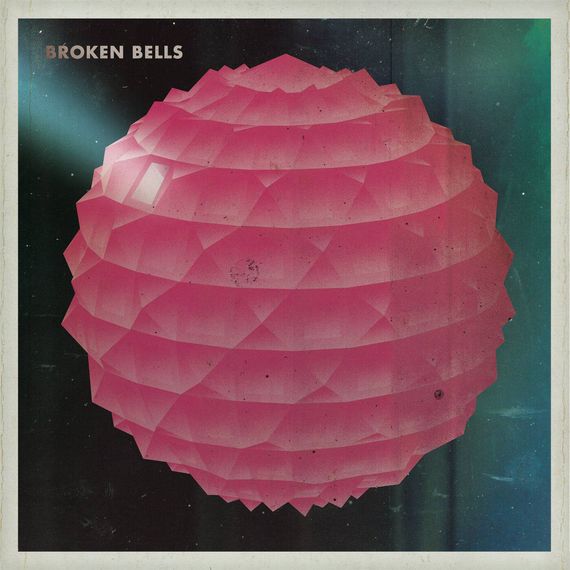
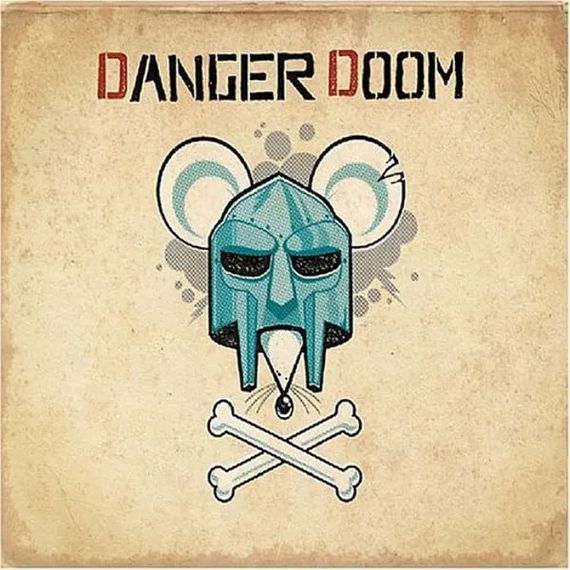
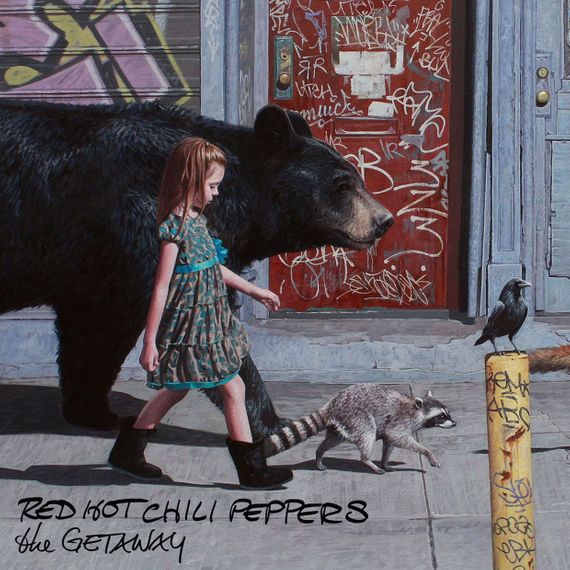
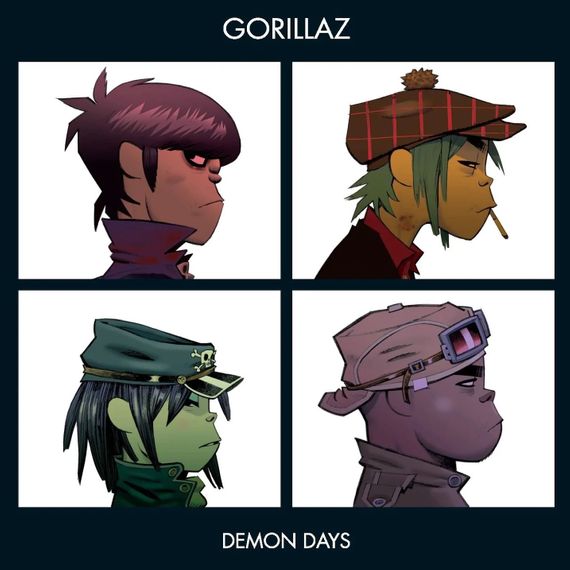
Was there ever movement on a second DANGERDOOM album?
Yeah. There were some ideas. That’s where some of the demos with Black Thought came from. There were things we did that had DOOM and Black Thought on them and then we did a couple other songs. I didn’t think the quality was high enough with what we were doing. I was super-busy with Gnarls, and I was just more interested in doing some different things with singers.
You end up making the record with Beck, Modern Guilt.
Yeah. Beck. The Keys. Then I met James.
You also worked on the Sparklehorse record.
It was right around that time, too. I was nuts. I was doing so much stuff. I stopped DJ-ing around that time, too. Hip-hop was changing in a way that I wasn’t connecting with as much myself, and I wasn’t going to fake it. The music I was connecting with more was mostly psychedelic music.
The Dark Night of the Soul album with Mark Linkous from Sparklehorse strikes me as this wild time. You’re holding on to people’s last-ever recordings — some of the final Mark Linkous music, some of the last Vic Chesnutt stuff — but the label just wasn’t excited about it, so you released the package with a blank CD-R as a statement? What was the idea there?
Basically what happened was I always make my own records first. That’s just what I do. I don’t generally take advances from labels and then make the records with it. I will make a record and then see who wants to buy it afterward. I have complete creative control. It’s just a weird thing. When you do it the other way, you have to kinda give them what they’re expecting because they gave you money. And I don’t need that anywhere near my head. The Rome album, Dark Night of the Soul, Broken Bells, the Gnarls records — I made all those before any labels. When they’re completely done, I went to them saying, “Here’s this thing I made. Do you want it?” That’s how I make records. Nobody hears them until they’re done. And then they’ll tell me how much it’s worth to them.
I made Dark Night of the Soul, but I was under contract. I went to the label with the record. They really didn’t seem like they wanted it. They weren’t going to pay me the money I made to make it. It was in limbo, the record. Because they wanted me to do pop stuff. “We want Gnarls Barkley,” basically. I was almost done with Rome, and I had made that on my own as well, with my own money. We came to a stalemate; they wouldn’t pay for the record, but they wouldn’t let me release it on my own, either. I got with David Lynch, and he did a bunch of these great photos for each song and everything, actually sang on the record. And then we made a photo book. But back then, CDs were still a big thing. We made the book, and we put the CD in the book. The CD was a blank CD-R, but it had the artwork. I made it myself because I would get sued like The Grey Album if I put the music on it. Then, mysteriously, the album leaked. I don’t know how that happened. But if you bought the book with the blank CD, you could just put the music on there yourself, and the label couldn’t do anything about it.
Mark Linkous was still alive when we did the Dark Night of the Soul book. He understood why we were doing the book with David Lynch. He loved all that kind of stuff. He wasn’t very happy with the label situation. The same label that we were fussing with just dropped him as an artist. “We just dropped Mark Linkous. Why do we want a Danger Mouse and Sparklehorse album?” I was the one under contract. We renegotiated everything, and we set up a release date, and Mark committed suicide. It was terrible. And now DOOM’s gone. Three people on the record. We did a song with DOOM that was going to be on the record …
The one that came out a few years ago?
We always really liked it. It just didn’t fit with the album. We always wanted to do something with it. We wound up putting that out separately, but I always consider that as part of that album, in a weird way.
That makes sense. Did CeeLo’s bad press put a damper on a third Gnarls album? People don’t see him the same way they did in the 2000s.
No, nothing like that. He and I have been working.
He was one of my top-five rappers in the 2000s, then he kinda stopped rapping.
CeeLo and I have been working on music on and off for the last ten years. We haven’t finished what would be considered a project yet. But with everything else you’re saying — I don’t know. We’ll have to see when that happens. As far as he and I personally are concerned, we’ve always been very close, and we have a really good music thing going. Or we did. But we’ve been making music over the years, and we’ll see what happens with it. I don’t know when it will be finished.
DANGERDOOM has one of the slicker, cleaner-sounding records of that mid-2000s DOOM streak. Songs like “Benzi Box” were smooth in a way that DOOM beats have no interest in. I’m also thinking a lot about DOOM as this comic and historian figure. The bars would have all these references to ancient wrestlers and stores that aren’t open anymore. What was it like working with that guy?
My thing with DOOM was we had this overlap of the geography where he lived in the suburbs of Atlanta where nobody was around, and so did my parents, and they lived nearby. I would visit my parents a few times a year, and I’d go hit up DOOM. We’d go to Applebee’s and we would be hanging out, talking music and our conquer-the-world thing and where we were at with what we were working on. In the meantime, we found a way to make an album and actually maybe make some money off of it, too. The Adult Swim thing was interesting … The reason the Adult Swim characters are on there is because DOOM is always using comic-book stuff for skits, and it covers up, I think in some ways, that there’s not really song structures and choruses. There’s not really stuff like that on there. How do you fill up a whole album? You gotta do it in a creative, fun, and silly way. It was like, Let’s find a new way to do that.
I had the Adult Swim connection because I’d done some music for them. I was like, I bet we could sample all that stuff because it’s really quirky. We didn’t know what Adult Swim was going to turn out to be. I lived in L.A. at the time. He would come out and stay in the room next to me in the house I was renting. For days at a time, I wouldn’t even see him. He’d just be in there listening to stuff, writing, and recording. We did everything but make the music together. I made the music first. He picked the stuff he liked. He wrote and recorded on his own and then we would play stuff back and forth. It was almost like Christmas every time he’d finish something. I got to know him really well over the years. Then we did the album. I was always surprised at the kind of stuff he wanted to use from the beats I had. Sometimes it was obvious. “Benzi Box” was just me screwing around, trying to do something that sounded like Dr. Dre, for fun. I don’t usually do stuff like that. It was making a beat without samples, and he liked it. I got CeeLo on it. We were already doing Gnarls Barkley, so he popped on. All that stuff happened really fast. It was right after I was doing stuff with the Gorillaz, which was the first call that I got that I really took seriously.
That first Gorillaz album felt like a blueprint for a lot of the ways that rock and rap would come together in indie spaces over the next decade.
The first Gorillaz record … I didn’t get it that much. I liked some of the stuff on it. I liked Blur more than I liked what Gorillaz had already done. I just didn’t get what they were really doing. I hadn’t gotten around to it, really. When Damon Albarn called about the second one, I wasn’t sure what that was going to be. But working with him and learning the stuff I did from him, as far as songwriting and working without samples and working with musicians and especially working very hands-on with singers, was the best thing for me. After that, I really had a lot of confidence to try stuff I had never done before because I had never produced an album. That’s still probably the biggest album I ever did, Demon Days. It was the first time I ever produced an album that was not my own in my bedroom.
You’ve been nominated for Producer of the Year at the Grammys a few times. What’s the best album that you worked on? Would you say it’s Demon Days?
To me, it’s the most romantic because of how and when it happened. There were no real rules with that record. Actually, I haven’t heard it in a long time, so I don’t know if it holds up for me, personally.
It never left rotation for me. I’ve been thinking about the Bootie Brown verse from “Dirty Harry” a lot: “I’m the reason why you fill up your Isuzu.” I go up for that line. I don’t know what he’s talking about.
I thought it was referencing the Middle East and gas prices going up. It was interesting how that song came together, because that was the first song. I came over to meet Damon, and he said he wanted to see if we would get along, and we talked about music in the listening room, and he was like, “Let’s just try a song.” I was like, “I’m not prepared. I don’t know how to use anything except the stuff in my bedroom.” He had a real studio, and we started messing around. He had a demo for “Dirty Harry.” I took the demo home and got Bootie Brown to rap on the end of it and then got this kids’ choir. I bought them pizza and had them sing the part. I came back to Damon with that, and that’s what basically got me the job. But most of that record is still Damon. He’s got such great melodies, and he played most of the instruments on a lot of it. It was a really good thing for me to work with someone like him so early on because then I wasn’t afraid to work with anybody. He’s got a big personality. He’s a tough guy, but he just cares about the music. That sounds cliched, but it’s true. You realize you don’t have to deal with people who don’t care about just the music. I don’t have to lower my standards.
In the U.S., the National Suicide Prevention Lifeline is 1-800-273-8255.



